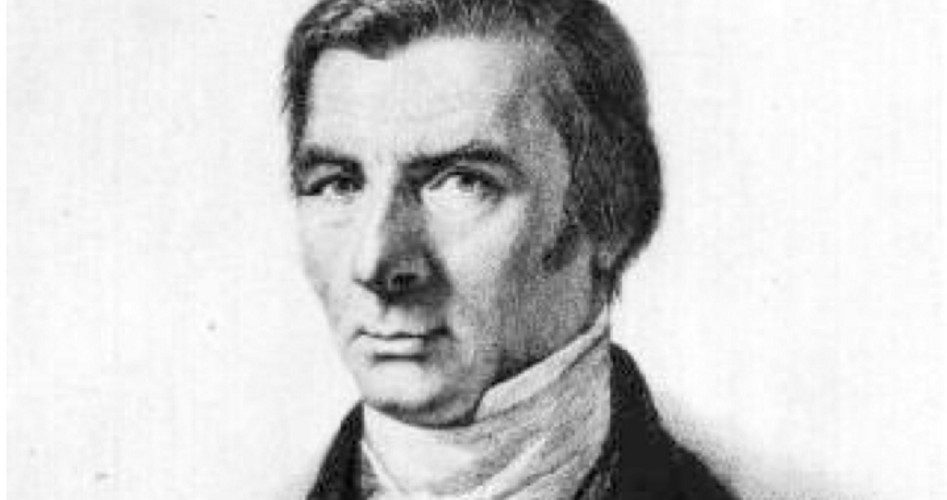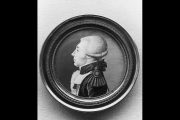
Two hundred and fourteen years ago today, Frederic Bastiat (shown) was born. His life was cut short by disease, but before he turned 50, he had written several seminal works, including a powerful pamphlet that would expose the organized plunder that is the government.
In words that echoed those of the Declaration of Independence penned some 73 years prior, Bastiat declared in The Law:
We hold from God the gift which includes all others. This gift is life — physical, intellectual, and moral life.
But life cannot maintain itself alone. The Creator of life has entrusted us with the responsibility of preserving, developing, and perfecting it. In order that we may accomplish this, He has provided us with a collection of marvelous faculties. And He has put us in the midst of a variety of natural resources. By the application of our faculties to these natural resources we convert them into products, and use them. This process is necessary in order that life may run its appointed course.
Life, faculties, production — in other words, individuality, liberty, property — this is man. And in spite of the cunning of artful political leaders, these three gifts from God precede all human legislation, and are superior to it. Life, liberty, and property do not exist because men have made laws. On the contrary, it was the fact that life, liberty, and property existed beforehand that caused men to make laws in the first place.
Man gets his rights from God and to protect those rights from each other, man institutes government. There is, Bastiat insists, no other rightful role of government than to act as a collective organization of man’s individual natural rights.
“The law is the organization of the natural right of lawful defense. It is the substitution of a common force for individual forces. And this common force is to do only what the individual forces have a natural and lawful right to do: to protect persons, liberties, and properties; to maintain the right of each, and to cause justice to reign over us all.”
Recognizing that in his own country and in his own time government had usurped powers far beyond that limited roster granted to it, Bastiat proposed perversion of the law as the cause. He observed:
But, unfortunately, law by no means confines itself to its proper functions. And when it has exceeded its proper functions, it has not done so merely in some inconsequential and debatable matters. The law has gone further than this; it has acted in direct opposition to its own purpose. The law has been used to destroy its own objective: It has been applied to annihilating the justice that it was supposed to maintain; to limiting and destroying rights which its real purpose was to respect. The law has placed the collective force at the disposal of the unscrupulous who wish, without risk, to exploit the person, liberty, and property of others. It has converted plunder into a right, in order to protect plunder. And it has converted lawful defense into a crime, in order to punish lawful defense.
In describing a scenario that sounds as if written this week rather than over 200 years ago, Bastiat warned that when government took from one person or group of people that which rightly belonged to him and used the law to force a transfer that property it to another individual or group of people to whom it did not rightly belong, liberty was abolished and absolutism reigned in its stead. He wrote:
When a portion of wealth is transferred from the person who owns it — without his consent and without compensation, and whether by force or by fraud — to anyone who does not own it, then I say that property is violated; that an act of plunder is committed.
I say that this act is exactly what the law is supposed to suppress, always and everywhere. When the law itself commits this act that it is supposed to suppress, I say that plunder is still committed, and I add that from the point of view of society and welfare, this aggression against rights is even worse. In this case of legal plunder, however, the person who receives the benefits is not responsible for the act of plundering. The responsibility for this legal plunder rests with the law, the legislator, and society itself. Therein lies the political danger.
Do we not see this in our own political system today? Property in the form of money is forcibly taken from those who work to accumulate it and is redistributed to others who have no claim on the property.
All three branches of the government of the United States have colluded to plunder property, to make legal for themselves that which would be illegal for the individuals they are supposed to serve.
So, what do we do, finding ourselves in this deplorable situation? Bastiat has some counsel:
Quite simply. See if the law takes from some persons what belongs to them, and gives it to other persons to whom it does not belong. See if the law benefits one citizen at the expense of another by doing what the citizen himself cannot do without committing a crime.
Then abolish this law without delay, for it is not only an evil itself, but also it is a fertile source for further evils because it invites reprisals. If such a law — which may be an isolated case — is not abolished immediately, it will spread, multiply, and develop into a system.
The person who profits from this law will complain bitterly, defending his acquired rights. He will claim that the state is obligated to protect and encourage his particular industry; that this procedure enriches the state because the protected industry is thus able to spend more and to pay higher wages to the poor workingmen.
Do not listen to this sophistry by vested interests. The acceptance of these arguments will build legal plunder into a whole system. In fact, this has already occurred. The present-day delusion is an attempt to enrich everyone at the expense of everyone else; to make plunder universal under the pretense of organizing it.
How timely is this tiny book?
In 2011, when asked what one book he would recommend that every American read, without hesitation, Ron Paul replied, “Read The Law, by Bastiat.”
Good advice. Celebrate Bastiat’s birthday by taking the time to read this very short pamphlet and learn a little more about what is and is not The Law.



